 |
| Download pdf file | Newsletter archives |
| Dieser Newsletter auf Deutsch | Cette newsletter en français |
1. New EWC Directive under negotiation |
 |
|
Positions still far apart
The European Commission had already presented the draft law to revise the EWC Directive in January 2024 (see report in EWC-News 1/2024) and in June 2024 the Council of Ministers adopted its position (see report in EWC-News 2/2024). In December 2024, the European Parliament confirmed its proposed amendments (see report in EWC-News 4/2024). Only the left-wing government of Spain fully supports all demands of the European Parliament. Some other countries consider individual proposals debatable.
Most countries warn against extending the scope and slowing down decision-making processes through additional bureaucracy. Insufficiently clarified formulations in the new directive text would lead to a lack of legal certainty. The gender quota in the EWC is rejected by a majority, as this restricts the free election of delegates. Shortening the three-year period for negotiations on the establishment of an EWC is also rejected. Many are critical of the EWC having its own legal personality. The European Parliament's demand to grant the EWC the right to interim injunctions has received particularly little support. The European Commission also considers this to be disproportionate. Trilogue negotiations will continue on 19 March 2025, with further dates planned for 6 and 20 May 2025. It is currently unclear when the trilogue negotiations will be concluded.
Comparison of the three positions |
2. Further developments at the European level |
 |
|
Will the minimum wage directive be repealed?
The entire directive could soon be declared null and void because the EU treaties do not assign any competences to the European legislator to regulate wages. This was the conclusion of the opinion of the Advocate General at the European Court of Justice on 14 January 2025. The opinion is an independent, non-binding expert opinion that provides the Court with a well-founded analysis and recommendation for its decision. The judges can deviate from these if they come to a different legal assessment. For the European Trade Union Confederation (ETUC), the opinion could jeopardise the most important workers right acquired at EU level in a generation.
The legal action was initiated by Denmark in January 2023 (siehe report in EWC-News 1/2023). Sweden joined in April 2023. The trade unions in Denmark and Sweden fear a loss of union members if all employees are legally entitled to the minimum wage – including those who do not belong to a trade union. The Swedish trade union confederation LO temporarily suspended its contributions to the ETUC in protest (siehe report in EWC-News 1/2022).
Interview on current state of proceedings Legal and political analysis of the opinion The European minimum wage report 2025 Guidelines on the AI Regulation
No further labour law initiatives planned
No new legislative initiatives are planned in social and labour law, only the revision of the EWC Directive is to be finalised. The European Trade Union Confederation (ETUC) regrets the lack of proposals for directives on subcontracting, preventing work-related stress, the right to disconnect and the use of artificial intelligence (AI) in the working world. The European Commission wants to work with the social partners to present a roadmap for quality jobs and reaffirms that the social dialogue remains a fundamental part of its work (see report in EWC-News 1/2024).
On 26 February 2026, the European Commission proposed that the Supply Chain Directive be postponed by one year. The affected companies would no longer have to ensure compliance with human rights and environmental standards throughout their entire supply chain, but only with their direct suppliers. Proof would only be required every five years. Civil liability for violations would also be limited. Non-governmental organisations and trade unions had already protested against this on 14 January 2025.
The European Commission's work programme Call from non-governmental organisations and trade unions The proposals to reduce reporting obligations |
3. Individual country reports |
 |
|
First national collective agreement for banks in Romania
A collective bargaining agreement had been in place since 2018, but it only applied to five large foreign-owned banks (see report in EWC-News 2/2022). The new collective agreement raises the minimum wage to 4,500 lei (€900) on 1 May 2025. At the beginning of 2022, it was still 2,500 lei (€500), representing an increase of 80%. The collective agreement also includes guaranteed overtime pay, a minimum half-hour lunch break and a minimum severance pay of six months' salary for employees with more than 15 years of service.
Report on the collective bargaining agreement No digital access rights for trade unions in Germany
This question is controversial in Germany because, unlike in France or other Mediterranean countries, trade unions have no statutory place within the German representation system at the workplace. Although they can nominate candidates for works council elections and attend meetings and assemblies as guests, their offices are located outside the company. All rights to negotiate internal company issues are exercised by the works council, not by them. In Germany, although there are many works councils that consist mainly of trade union members, there are also works councils with no trade union involvement at all (see report in EWC-News 1/2023). This makes no difference to the legal rights of the works council. On the other hand, wage increases in Germany are regulated in collective agreements, which are negotiated by trade unions, usually for an entire industry and not for individual companies. Communication and mobilisation are increasingly becoming a problem for trade unions in the absence of digital access rights.
The legislator wanted to take action before the German parliamentary elections
The issue was already part of the coalition agreement of the so-called traffic-light coalition in December 2021, but had not yet been implemented by the time the coalition broke up on 6 November 2024. On 5 September 2024, the previous federal government had nevertheless submitted a bill that included digital access rights for trade unions. It is currently unclear whether this bill will be pursued by the new federal government.
Federal Labour Court press release Press report on the court ruling Weekly working hours in Spain to drop
Currently, the average working week is 38.3 hours because many sectoral collective agreements already provide for fewer weekly hours. The aim is to adapt existing collective bargaining agreements to the new law by 31 December 2025. In addition, a maximum of 80 hours of overtime per year will be allowed. Spain is currently experiencing strong economic growth (forecast at 2.5% for 2025), and the unemployment rate has fallen to its lowest level in 17 years. However, at 10.6% (December 2024), it is still the highest in all EU countries. The lowest rate is in the Czech Republic at 2.6%.
The law also regulates the recording of working hours, which in future should be done by “digital means” so that they can be checked online. Breaks and leisure time should be strictly adhered to and employees should not be allowed to be contacted during these times, not even by email (right to disconnect). It is not certain whether the law will be adopted in parliament, because the minority left-wing government is constantly having to seek new majorities (see report in EWC-News 1/2020).
Press report on the initiative |
4. Video conferencing instead of face-to-face meetings |
 |
|
British conciliation body rejects right to face-to-face meetings
Neither the UK EWC Act nor the EU directive define the format of EWC meetings. The only exception relates to seafarers who can participate via video conference (see report in EWC-News 2/2017). As recently as February 2018, the CAC had ruled that a conference call does not replace an extraordinary EWC meeting (see report in EWC-News 1/2018). In June 2020, the Court of Appeal of Tuscany ruled that the refusal of central management to hold face-to-face meetings was anti-union behaviour (see report in EWC-News 2/2020). Both decisions relate to events that took place before the coronavirus pandemic. The new decision by the CAC, on the other hand, also allows video conferencing on the grounds that this has been practised everywhere during the pandemic. The decision is formally not valid for EU countries, but is noteworthy in terms of the arguments put forward.
The EWC's arguments
Extraordinary meetings should, as a rule, take place in person and not online, unless the central management and the EWC have agreed otherwise. The central management cannot unilaterally decide to hold the meeting online against the express wish of the EWC. Being present in person strengthens the solidarity between the EWC members, as they can discuss views and issues together in the meeting room. This is lost when everyone is isolated in front of a screen in an office or even in a bedroom far away from each other, scattered across Europe. The dynamics that arise from face-to-face interaction are lost.
At the oral hearing at the CAC, however, the EWC had to concede that it had been possible to hold online consultations during the pandemic. It could not give a reason why this should no longer be possible after the lockdown was lifted. In the current case, the EWC was even able to adopt its opinion and conclude the consultation procedure following the video conference. At the British Council, video conferencing is widely used outside of EWC work. Therefore, in the opinion of the CAC, central management was able to unilaterally determine the format of the meeting.
|
5. Does the Irish EWC law comply with European law? |
 |
|
High Court deals with EWC issue for the first time
The hearing is an appeal against the Labour Court's August 2024 ruling whereby it had declared itself incompetent to rule on an EWC legal issue. Irish EWC law only provides for legal recourse for individual actions, but not for collective disputes (see report in EWC-News 3/2024). This means that European Works Councils would be excluded from the rule of law. If the ruling were to become legally binding, all companies in Ireland could in future completely ignore EWC law without the possibility to take legal action against it. The legal dispute is of fundamental importance across Europe, as the country has been ranked third as preferred EWC location directly after Germany and France since Brexit (see report in EWC-News 1/2021).
Irish government intervenes in the proceedings
On 4 February 2025, the office of the Chief State Solicitor formally notified the court that the government was joining the proceedings as an intervening party. This decision shows the major significance of the issue, because the Irish government must explicitly explain to the High Court why the European Commission's arguments in the infringement proceedings are not valid. In the trilogue negotiations in Brussels on the revision of the EWC Directive, the Irish government is currently blocking some points. It does not want to grant the EWC legal personality and rejects the provision that all legal and court costs should be borne by the central management. However, it is precisely these issues that the High Court must now deal with.
The Irish government's position had previously been shared by the UK government until the courts ruled otherwise. The Verizon case, when the EWC was still subject to British law, is considered a historic turning point. Central management was fined for not paying the EWC's lawyer (see report in EWC-News 3/2020). Such costs are part of the “means required” for the EWC to fulfil its tasks. In September 2023, the Court of Appeal for England and Wales ruled that all legal costs should also be borne by the central management (see report in EWC-News 3/2023).
Austria already provides a legal reasoning
This issue has also been resolved in Austria. After proceedings before the Austrian Supreme Court, the Labour and Social Court of Vienna ruled in August 2024 on the reimbursement of costs (see report in EWC-News 3/2024). The central management had to pay legal fees, default interest and other incidental costs amounting to €100,000. The reasoning behind the court ruling is interesting:
The obligation of the defendant central management to bear the costs is not comparable to the obligation of a party that has lost a civil action to reimburse the costs. According to the subsidiary requirements of the EWC Directive, the administrative expenses of the European Works Council (per se) are to be borne by the central management, which is to provide the members of the European Works Council with the necessary financial resources to enable them to perform their duties in an appropriate manner. If the central management's obligation to bear the costs ... were to depend on whether or to what extent ... there is a claim for reimbursement of costs, this would have the consequence that a European Works Council could not conduct civil proceedings due to a lack of assets. Such an interpretation would ... run counter to the EWC Directive.
Article in a specialised journal about the case in Austria
Forthcoming event From 30 June to 3 July 2025, the EWC Academy will be holding a seminar in Dublin that will address previous EWC case law across Europe. The programme includes a visit to the oral proceedings at the High Court.
|
6. Updated EWC agreements |
 |
|
Finnish IT group once again with EWC agreement
The EWC includes delegates from 25 countries, with at least one seat for each small country. Switzerland and the United Kingdom have observer status. Two plenary sessions are held each year. The select committee has five members and five deputies as replacements in a predetermined order. A comprehensive procedural description has been drawn up for consultations in exceptional circumstances. This gives the company the assurance that the consultation will be completed after a maximum of three months. Predefined documents must be communicated to the EWC for this purpose, otherwise the entire procedure is suspended and the measures may not be implemented. National and European consultations are distinguished from each other in the EWC agreement. In all cases, implementation will only take place once the central management has responded to the EWC's opinion. Furthermore, there are the usual provisions on costs, equipment, training, experts and confidentiality. As soon as a new EWC directive is transposed into Finnish labour law, the new rules will apply immediately without the need for renegotiation.
Swedish architecture and engineering group with new EWC agreement
The EWC agreement covers the European Economic Area, the United Kingdom and Turkey. The EWC is responsible for issues that affect two countries, but also when decisions are made in Stockholm that affect only one country outside Sweden. Two plenary meetings are held each year, one in Stockholm with the presence of the CEO and the other in a different country. The select committee can request extraordinary meetings at any time, which can be held as video conferences if required. However, it can request face-to-face meetings if it considers this necessary. The select committee must render its opinion within four weeks of the meeting. If the EWC agreement is terminated, it continues to apply until a new agreement has been concluded. This means that both sides have a veto on any change, and the subsidiary requirements will never be applied. If a new EWC directive is adopted, there is a special right to renegotiation. |
7. Newly established European Works Councils |
 |
|
EWC for German-Austrian medical device manufacturer
The EWC can decide independently whether its members may participate in a meeting by video or telephone conference according to precisely defined rules. Votes are not taken according to the number of members, but according to the number of employees represented. Once a year, it can send individual or all members to training events. Confidentiality is based on the EU directive on the protection of confidential business information, according to which redundancies are not subject to confidentiality obligations (see report in EWC-News 4/2020). In the event of restructuring, the EWC is informed in good time so that it can still influence the employer's plans and decisions. In the event of disputes, a joint committee is set up. If no agreement can be reached within three months, the matter can be referred to the labour court.
Belgian packaging manufacturer sets up EWC
Meetings with central management take place once a year and are chaired by management. They extend over three days, including one day of training. EWC members elect a select committee of three members from different countries and sectors. Extraordinary meetings are generally held virtually. There are very detailed rules on confidentiality. Every year, a budget is agreed for training and experts, who are allowed to attend meetings with management. The choice of training provider is discussed between management and the EWC, with the select committee always having the last word. The EWC agreement literally states that “participation in all training is mandatory”. EWC members are not only granted time-off work for meetings, but also to exchange views with local works councils or employees in their home country. A mediation procedure is provided for in the event of disputes regarding the EWC agreement. If the agreement is terminated and no new agreement is reached, the subsidiary requirements automatically apply (EWC “by law”). French certification company sets up EWC
The EWC represents almost 11,000 employees in twelve countries of the European Economic Area, excluding the United Kingdom. Nine seats are allocated to France, two to Spain and one each to Italy and Slovenia. All other countries have fewer than 150 employees and are not allocated a seat. Due to the strong growth of the group, a new delegate quota is calculated every year. Two meetings are held each year under the chairmanship of the employer, one of which is a video conference. If the agenda of a meeting cannot be dealt with in full, the meeting is continued as a video conference within two weeks. Each EWC member is entitled to 25 hours of time-off work per year in addition to the time spent at meetings, with a further ten hours for the five members of the select committee and a further 20 hours for the secretary. All EWC members and substitute members are entitled to five days of training during their four-year term of office.
The EWC is responsible for all issues that affect two countries and at least 30 employees each. In the event of restructuring, central management will call an extraordinary meeting of the select committee, which must then be followed by a plenary meeting of the EWC via video conference if requested. The EWC cannot appoint experts of its choice, but must use the consultancy firm of the French group works council. All other features of the EWC agreement are strongly orientated on the subsidiary requirements of the EU directive.
|
8. Pan-European company agreements |
 |
|
Spanish clothing group preventing harassment at work
At the global level, the trade unions have been working with Inditex since 2007, when the first international framework agreement for the entire industry was concluded. In October 2022, it was significantly enhanced (see report in EWC-News 4/2022). By contrast, a European Works Council has only existed since September 2018 (see report in EWC-News 4/2018). In December 2020, it was able to enforce a digitalisation agreement that includes a commitment to avoid redundancies (see report in EWC-News 1/2021).
Framework agreement on work-life balance
Employees with relatives in need of care are entitled to reduce their working hours. There are rules on working conditions during pregnancy, parental leave, support for single parents or in the event of the death of a close relative. Compliance with the agreement is monitored by a committee made up of management and ten employee representatives, including a representative of the European Works Council. This is the third pan-European agreement for Safran. There has been an agreement on the professional integration of young people since 2013 (see report in EWC-News 1/2024) and one on skills development and ensuring career progression since 2015 (see report in EWC-News 2/2021).
Fair treatment of employees in change management
The principles for change management stipulate that alternative measures must first be examined before any redundancies can be made. These include the use of natural attrition, continued employment after training and education, part-time work, job sharing, a collective reduction in working hours, severance agreements, voluntary transfers, mobile workplaces and the extension of notice periods to bridge the period until retirement. Central management will also support the establishment of employee representation, as so far only Germany and France have works councils. Under the SE agreement, employees in small countries without employee representation can turn directly to the SE works council, which has a right of dialogue with central management and can monitor the principles. |
9. The view beyond Europe |
 |
|
Improved relations with trade unions at German logistics group
World's largest tea producer commits to tackling sexual harassment
Global framework agreement with additional chapters
The new framework agreement contains several additional topics, particularly in the areas of digital transformation, due diligence, environmental sustainability and rights in the workplace. The chapter on digital transformation now also includes provisions on AI. Local feedback will be strengthened for monitoring purposes and a global monitoring committee made up of management and trade union representatives will meet once a year. The employee side elects a secretary who has an annual allowance of 80 days’ time-off work to monitor the proper implementation of the agreement. There is a steering committee that can organise at least two meetings a year as well as site visits.
Report on the new framework agreement Download the framework agreement |
10. Interesting websites |
 |
|
A website documenting the implementation of the minimum wage directive
Website on the minimum wage directive Developments and analysis of AI legislation
Social security country by country
Worldwide cooperation between US trade unions
|
11. New publications |
 |
|
Social standards in the outsourcing of business processes
Guide to artificial intelligence (AI)
Further information with sample pages Handbook for European Works Councils in the transport sector
Download other language versions Guidance for reinforcing collective bargaining
Guide to reinforcing collective bargaining |
12. The EWC Academy: Examples of our work |
 |
|
17th Conference for European and SE Works Councils in Hamburg
A few days before the start of the trilogue negotiations on the revision of the EWC Directive, 53 participants from eight countries gathered in Hamburg on 27 and 28 January 2025 to obtain first-hand information on the current status (in the photo, MEP Gabriele Bischoff in the middle). Other topics included recent developments in EU law, exemplary EWC agreements and recent EWC and SE court rulings. The work of the Ardagh Group's Irish EWC was presented as an example of best practice (see report in EWC-News 4/2023). The first day ended with a harbour cruise and dinner at the Maritime Museum in the historic Speicherstadt warehouse district.
As always, the second day was dedicated to working groups: there were discussions on current developments in Britain and France and the effects of Brexit on European Works Councils, as well as co-determination aspects of the new EU regulation on artificial intelligence (see report in EWC-News 3/2024) The next Hamburg Conference will take place on 26 and 27 January 2026. Restructuring at French industrial gas producer EWC establishment in US software company |
13. Current seminar schedule |
 |
|
The EWC Academy and its predecessor organisation have been conducting conferences and seminars for members of European Works Councils, SE Works Councils and Special Negotiating Bodies since January 2009. So far, 960 employee representatives from 322 companies have taken part including many of them on multiple occasions. This corresponds to 25% of all transnational works council bodies in Europe. Among them are also 30 companies with the legal form SE (European Company). In addition, there are numerous in-house events and guest lectures given to other organizations.
Overview of forthcoming seminar schedule Works council seminar in Gdańsk (last-minute participation still possible)
Introductory seminar at Montabaur Castle (last-minute participation still possible)
Report from a previous seminar in Montabaur Legal EWC seminar in Dublin
The second EWC legal seminar will take place in Dublin from 30 June to 3 July 2025. With Brexit, many US companies have moved their EWC from the UK to Ireland, pushing the country up from 13th place to third place in the EU, after Germany and France. A case is currently pending in the High Court that could potentially end up in the European Court of Justice (see report in EWC-News 3/2024). The seminar includes a visit to the oral proceedings at the High Court. It also covers legal disputes involving European Works Councils in France, Germany, Austria, Finland and Norway, and presents two more recent EWC agreements under Irish law.
Report from the last seminar in Dublin EWC and SE seminar in Paris
Report from the last seminar in Paris Seminar on the renegotiation of EWC agreements in Würzburg
In-house events
|
14. Imprint |
 |
|
EWC News is published by: |
 |
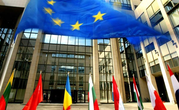 Trilogue negotiations on the new EWC Directive began in Brussels on 6 February 2025. The trilogue is an informal negotiation involving representatives of the European Parliament, the Council of Ministers and the European Commission. The aim of a trilogue is to reach a provisional agreement on a legislative proposal that is acceptable to all parties. Such an agreement must then be adopted by each of the institutions in formal procedures.
Trilogue negotiations on the new EWC Directive began in Brussels on 6 February 2025. The trilogue is an informal negotiation involving representatives of the European Parliament, the Council of Ministers and the European Commission. The aim of a trilogue is to reach a provisional agreement on a legislative proposal that is acceptable to all parties. Such an agreement must then be adopted by each of the institutions in formal procedures. In November 2022, the directive on adequate minimum wages came into force (see
In November 2022, the directive on adequate minimum wages came into force (see  On 4 February 2025, the European Commission presented guidelines to ensure the consistent, effective and uniform application of the contents of the AI Regulation. The guidelines are not legally binding, but they provide explanations and practical examples to help understand and comply with the requirements. They focus on prohibited high-risk AI systems such as social scoring, biometrics and emotion recognition. The AI Regulation has been in force since August 2024 (see
On 4 February 2025, the European Commission presented guidelines to ensure the consistent, effective and uniform application of the contents of the AI Regulation. The guidelines are not legally binding, but they provide explanations and practical examples to help understand and comply with the requirements. They focus on prohibited high-risk AI systems such as social scoring, biometrics and emotion recognition. The AI Regulation has been in force since August 2024 (see 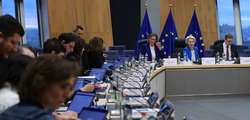
 Since 27 November 2024, a universally binding collective agreement has applied to all 45,000 bank employees in Romania. This is the first time that the banking union FSAB has succeeded in actively using the collective bargaining reform adopted by parliament in November 2022 to extend a collective agreement to the entire industry. The legislative reform is directly linked to the EU directive on adequate minimum wages, which includes a reinforcement of collective bargaining coverage (see
Since 27 November 2024, a universally binding collective agreement has applied to all 45,000 bank employees in Romania. This is the first time that the banking union FSAB has succeeded in actively using the collective bargaining reform adopted by parliament in November 2022 to extend a collective agreement to the entire industry. The legislative reform is directly linked to the EU directive on adequate minimum wages, which includes a reinforcement of collective bargaining coverage (see 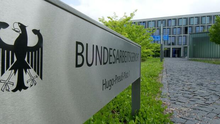 On 28 January 2025, the Federal Labour Court in Erfurt dismissed in the last instance the complaint filed by the Mining, Chemical and Energy Industrial Union (IGBCE) for digital access to the Adidas plant. The test case began in 2021, when many of the 5,400 employees at the sportswear manufacturer's headquarters in Herzogenaurach, Bavaria, were working exclusively from home due to the coronavirus pandemic. The IGBCE wanted to provide information about the collective agreement applicable to Adidas and recruit members, and demanded that the company hand over its email addresses, or alternatively provide a virtual central distribution list or a dedicated page on the company intranet.
On 28 January 2025, the Federal Labour Court in Erfurt dismissed in the last instance the complaint filed by the Mining, Chemical and Energy Industrial Union (IGBCE) for digital access to the Adidas plant. The test case began in 2021, when many of the 5,400 employees at the sportswear manufacturer's headquarters in Herzogenaurach, Bavaria, were working exclusively from home due to the coronavirus pandemic. The IGBCE wanted to provide information about the collective agreement applicable to Adidas and recruit members, and demanded that the company hand over its email addresses, or alternatively provide a virtual central distribution list or a dedicated page on the company intranet. On 4 February 2025, the Spanish left-wing government coalition, approved a bill to reduce weekly working hours from 40 to 37.5 hours while maintaining the same salary. It is considered a “historic step” since working hours had not been modified since 1983. On 20 December 2024, the government reached an agreement on this with the two major union confederations, UGT and CC.OO. The employers' organisations are opposed to the law and only want to reduce working hours gradually and regulate them separately for each industry.
On 4 February 2025, the Spanish left-wing government coalition, approved a bill to reduce weekly working hours from 40 to 37.5 hours while maintaining the same salary. It is considered a “historic step” since working hours had not been modified since 1983. On 20 December 2024, the government reached an agreement on this with the two major union confederations, UGT and CC.OO. The employers' organisations are opposed to the law and only want to reduce working hours gradually and regulate them separately for each industry. On 23 December 2024, the Central Arbitration Committee (CAC) in London, which continues to be the first instance in British EWC law after Brexit, ruled on a complaint filed by the EWC of the British Council (see
On 23 December 2024, the Central Arbitration Committee (CAC) in London, which continues to be the first instance in British EWC law after Brexit, ruled on a complaint filed by the EWC of the British Council (see  The High Court in Dublin has reserved three full days, from 1 to 3 July 2025, for the hearing of the legal dispute concerning the US company Verizon Communications. At the heart of the case is the question of whether the Irish EWC Act (TICEA) is compatible with the EWC Directive. On these grounds, the European Commission has been conducting infringement proceedings against the Irish government since May 2022 (see
The High Court in Dublin has reserved three full days, from 1 to 3 July 2025, for the hearing of the legal dispute concerning the US company Verizon Communications. At the heart of the case is the question of whether the Irish EWC Act (TICEA) is compatible with the EWC Directive. On these grounds, the European Commission has been conducting infringement proceedings against the Irish government since May 2022 (see 
 On 30 October 2024, an EWC agreement was once again concluded for Nokia after three years of negotiations. After many acquisitions and a large-scale restructuring of the group, the long history of the EWC “by law” operating on the basis of the subsidiary requirements has come to an end. In practice, there had been repeated conflicts over the interpretation of these regulations because the EWC was not sufficiently involved in restructuring. In 2013, the EWC of the former subsidiary Nokia Siemens Networks (NSN) had won extensive consultation rights at the arbitration body of the Finnish Ministry of Labour (“Co-operation Ombudsman”) (see
On 30 October 2024, an EWC agreement was once again concluded for Nokia after three years of negotiations. After many acquisitions and a large-scale restructuring of the group, the long history of the EWC “by law” operating on the basis of the subsidiary requirements has come to an end. In practice, there had been repeated conflicts over the interpretation of these regulations because the EWC was not sufficiently involved in restructuring. In 2013, the EWC of the former subsidiary Nokia Siemens Networks (NSN) had won extensive consultation rights at the arbitration body of the Finnish Ministry of Labour (“Co-operation Ombudsman”) (see  On 19 November 2024, a revised EWC agreement was concluded for Sweco in Stockholm. Europe's largest architecture and engineering firm has 22,000 employees (incl. 7,100 in Sweden) and has been steadily growing for years, partly through the acquisition of numerous small and large companies in the industry. The European Works Council was established in 2014, operates under Swedish law and is fully subject to the EU directive.
On 19 November 2024, a revised EWC agreement was concluded for Sweco in Stockholm. Europe's largest architecture and engineering firm has 22,000 employees (incl. 7,100 in Sweden) and has been steadily growing for years, partly through the acquisition of numerous small and large companies in the industry. The European Works Council was established in 2014, operates under Swedish law and is fully subject to the EU directive. On 29 October 2024, an EWC agreement was signed between the Special Negotiating Body and the Central Management of Lohmann & Rauscher in Neuwied (Rhineland-Palatinate). The company has 5,400 employees in 29 countries worldwide. The new European Works Council is made up of 15 delegates from 12 countries, who meet once a year (and for a second time if necessary) at a location close to the central management in the district of Neuwied. They elect a steering committee of four members who can hold three face-to-face meetings per year and video conferences. In addition, working groups can also be established.
On 29 October 2024, an EWC agreement was signed between the Special Negotiating Body and the Central Management of Lohmann & Rauscher in Neuwied (Rhineland-Palatinate). The company has 5,400 employees in 29 countries worldwide. The new European Works Council is made up of 15 delegates from 12 countries, who meet once a year (and for a second time if necessary) at a location close to the central management in the district of Neuwied. They elect a steering committee of four members who can hold three face-to-face meetings per year and video conferences. In addition, working groups can also be established. On 11 December 2024, an EWC agreement was concluded at the headquarters of VPK Group in Dendermonde (East Flanders). The group has 6,500 employees in 16 European and four non-European countries at 70 locations. The EWC has up to 25 members (maximum) including the UK and is responsible for issues that affect at least 10% of the European workforce in one or more countries or (in the case of restructuring) more than 50 employees. Opinions must be rendered within two weeks of all information being provided.
On 11 December 2024, an EWC agreement was concluded at the headquarters of VPK Group in Dendermonde (East Flanders). The group has 6,500 employees in 16 European and four non-European countries at 70 locations. The EWC has up to 25 members (maximum) including the UK and is responsible for issues that affect at least 10% of the European workforce in one or more countries or (in the case of restructuring) more than 50 employees. Opinions must be rendered within two weeks of all information being provided. On 13 December 2020, an EWC agreement was signed in La Défense, a business district in Paris, between the Special Negotiating Body and the central management of Apave. With 16,500 employees in 55 countries, the company is mainly active in technical monitoring and materials testing and is growing strongly through acquisitions. It was founded in 1867 as a testing association for steam engines in Alsace.
On 13 December 2020, an EWC agreement was signed in La Défense, a business district in Paris, between the Special Negotiating Body and the central management of Apave. With 16,500 employees in 55 countries, the company is mainly active in technical monitoring and materials testing and is growing strongly through acquisitions. It was founded in 1867 as a testing association for steam engines in Alsace. On 25 November 2020, Inditex's central management published an agreement concluded with the European Works Council on the prevention of violence against women and harassment at work. It applies to 126,000 employees in Europe (96,000 of whom are women) and makes human rights and health and safety at work a top priority. The agreement will be monitored by an EWC working group, which will present a report each year. Inditex operates brands such as Zara, Massimo Dutti, Bershka, Pull & Bear.
On 25 November 2020, Inditex's central management published an agreement concluded with the European Works Council on the prevention of violence against women and harassment at work. It applies to 126,000 employees in Europe (96,000 of whom are women) and makes human rights and health and safety at work a top priority. The agreement will be monitored by an EWC working group, which will present a report each year. Inditex operates brands such as Zara, Massimo Dutti, Bershka, Pull & Bear.
 On 27 January 2025, the SE works council and Eppendorf's central management agreed on principles for the socially responsible management of restructuring. The EWC Academy had been supporting the SE works council on this since September 2024 (see
On 27 January 2025, the SE works council and Eppendorf's central management agreed on principles for the socially responsible management of restructuring. The EWC Academy had been supporting the SE works council on this since September 2024 (see  On 2 December 2024, a new OECD protocol for the postal and parcel company DHL was signed in Berlin. This is intended to improve the dialogue with the international trade union federations UNI and ITF. In addition to the meetings at the global level, in the future there will also be regional dialogue forums between trade unions and management. DHL has almost 600,000 employees worldwide. For years, the group's management was criticised for its human resources policy outside Europe, until an agreement with the trade unions on a responsible social dialogue was signed for the first time in July 2016 (see
On 2 December 2024, a new OECD protocol for the postal and parcel company DHL was signed in Berlin. This is intended to improve the dialogue with the international trade union federations UNI and ITF. In addition to the meetings at the global level, in the future there will also be regional dialogue forums between trade unions and management. DHL has almost 600,000 employees worldwide. For years, the group's management was criticised for its human resources policy outside Europe, until an agreement with the trade unions on a responsible social dialogue was signed for the first time in July 2016 (see  On 16 December 2024, Lipton Teas and Infusions management released a Joint Commitment on preventing sexual harassment, concluded with the International Union of Food Workers (IUF). Female workers are considered to be particularly vulnerable in agricultural supply chains. The Dutch company, a former Unilever division, worked with the IUF to develop detailed guidelines for the joint implementation of the commitment in each workplace. These include a comprehensive definition of sexual harassment, its inclusion in local occupational health and safety management, and thorough risk assessments. Since January 2024, there has already been an agreement on worldwide social standards, which includes a monitoring committee made up of union representatives (see
On 16 December 2024, Lipton Teas and Infusions management released a Joint Commitment on preventing sexual harassment, concluded with the International Union of Food Workers (IUF). Female workers are considered to be particularly vulnerable in agricultural supply chains. The Dutch company, a former Unilever division, worked with the IUF to develop detailed guidelines for the joint implementation of the commitment in each workplace. These include a comprehensive definition of sexual harassment, its inclusion in local occupational health and safety management, and thorough risk assessments. Since January 2024, there has already been an agreement on worldwide social standards, which includes a monitoring committee made up of union representatives (see  On 27 January 2025, a new framework agreement on global social and environmental responsibility was concluded in Paris for the French state-owned electricity company Électricité de France (EDF), the second largest electricity producer in the world. The signatories include several French and global trade union organisations. A similar agreement has been in place since 2005 and was last revised in 2018 (see
On 27 January 2025, a new framework agreement on global social and environmental responsibility was concluded in Paris for the French state-owned electricity company Électricité de France (EDF), the second largest electricity producer in the world. The signatories include several French and global trade union organisations. A similar agreement has been in place since 2005 and was last revised in 2018 (see  The European Trade Union Confederation (ETUC) provides information on its WAGE-UP website concerning the fixing of minimum wages, the collective bargaining systems of EU countries and progress in implementing the minimum wage directive. The deadline was 15 November 2024, but most governments have not met it – some are even actively working against its objectives (see
The European Trade Union Confederation (ETUC) provides information on its WAGE-UP website concerning the fixing of minimum wages, the collective bargaining systems of EU countries and progress in implementing the minimum wage directive. The deadline was 15 November 2024, but most governments have not met it – some are even actively working against its objectives (see  The Future of Life Institute (FLI) is an independent non-profit organisation committed to reducing existential risks to humanity, in particular risks arising from artificial intelligence (AI). Established in 2014 at the Massachusetts Institute of Technology in the US, it also has an office in Brussels. For instance, it called on the European Commission to take into account the future possibilities of AI and to resist lobbying by industry. The institute is also campaigning for laws to regulate AI in the US. Its website includes an analysis of the AI law, a compliance checker and an overview of the key tasks of the European Office for AI and the EU member states.
The Future of Life Institute (FLI) is an independent non-profit organisation committed to reducing existential risks to humanity, in particular risks arising from artificial intelligence (AI). Established in 2014 at the Massachusetts Institute of Technology in the US, it also has an office in Brussels. For instance, it called on the European Commission to take into account the future possibilities of AI and to resist lobbying by industry. The institute is also campaigning for laws to regulate AI in the US. Its website includes an analysis of the AI law, a compliance checker and an overview of the key tasks of the European Office for AI and the EU member states. An updated version of the MISSOC database has been available online since 7 January 2025. It provides information on the social security systems in the individual EU countries, Iceland, Liechtenstein, Norway and Switzerland (as of July 2024). The Mutual Information System on Social Protection (MISSOC) provides comparative tables, synopses and guides for each country. The information is provided by a network of experts in the national ministries and institutions responsible for the administration of social protection, and is coordinated by the MISSOC Secretariat on behalf of the European Commission. The database is available in three languages.
An updated version of the MISSOC database has been available online since 7 January 2025. It provides information on the social security systems in the individual EU countries, Iceland, Liechtenstein, Norway and Switzerland (as of July 2024). The Mutual Information System on Social Protection (MISSOC) provides comparative tables, synopses and guides for each country. The information is provided by a network of experts in the national ministries and institutions responsible for the administration of social protection, and is coordinated by the MISSOC Secretariat on behalf of the European Commission. The database is available in three languages. The Solidarity Center, established in 1997, is the largest international workers' rights organisation in the United States. Together with the AFL-CIO trade union confederation, it supports workers around the world in their fight against discrimination and exploitation and in their efforts to achieve shared prosperity in the global economy. This includes, above all, the right to freedom of association and the right to establish trade unions in order to improve the specific situation at the workplace and to protect human rights. A team of more than 400 employees works in more than 60 countries, including several Balkan countries in Europe.
The Solidarity Center, established in 1997, is the largest international workers' rights organisation in the United States. Together with the AFL-CIO trade union confederation, it supports workers around the world in their fight against discrimination and exploitation and in their efforts to achieve shared prosperity in the global economy. This includes, above all, the right to freedom of association and the right to establish trade unions in order to improve the specific situation at the workplace and to protect human rights. A team of more than 400 employees works in more than 60 countries, including several Balkan countries in Europe. On 10 December 2024, the DGB trade union educational institute in Düsseldorf published a brochure entitled “Superoutsourcing” as part of the “Good Work Worldwide” project funded by the German government. It describes the megatrend of business process outsourcing (BPO) to the Global South. It is no longer limited to individual IT services, but includes entire business processes, such as finance and accounting, payroll, artificial intelligence (AI) model training or customer service with call centres. Behind this lies a huge, invisible workforce – in South Africa, Colombia, Kenya or the Philippines. To secure workers' rights, trade unions are seeking to conclude international framework agreements, such as with the French company Teleperformance, which currently employs 500,000 people worldwide (see
On 10 December 2024, the DGB trade union educational institute in Düsseldorf published a brochure entitled “Superoutsourcing” as part of the “Good Work Worldwide” project funded by the German government. It describes the megatrend of business process outsourcing (BPO) to the Global South. It is no longer limited to individual IT services, but includes entire business processes, such as finance and accounting, payroll, artificial intelligence (AI) model training or customer service with call centres. Behind this lies a huge, invisible workforce – in South Africa, Colombia, Kenya or the Philippines. To secure workers' rights, trade unions are seeking to conclude international framework agreements, such as with the French company Teleperformance, which currently employs 500,000 people worldwide (see 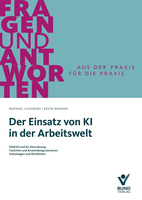 This practical guide to AI was published on 14 January 2025 and is aimed in particular at works councils. AI systems are an integral part of workflows and decision-making processes and influence the design of working environments. The EU regulation on artificial intelligence has been in force since August 2024 (see
This practical guide to AI was published on 14 January 2025 and is aimed in particular at works councils. AI systems are an integral part of workflows and decision-making processes and influence the design of working environments. The EU regulation on artificial intelligence has been in force since August 2024 (see 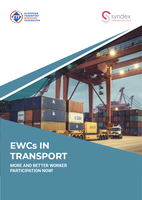
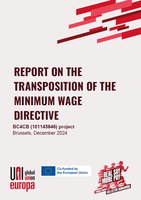 On 27 January 2025, the umbrella organisation of service sector trade unions (UNI-Europa) presented a study with a country-specific analysis of the current status of collective bargaining systems. All EU countries are presented individually in the 56-page report. The report is linked to the implementation of the minimum wage directive, which stipulates that 80% of employees must be covered by collective bargaining. Apart from the Scandinavian countries, only Austria, Belgium, France, Italy and Spain already meet this requirement. All other EU countries have until November 2025 to draw up action plans to reinforce collective bargaining coverage (see
On 27 January 2025, the umbrella organisation of service sector trade unions (UNI-Europa) presented a study with a country-specific analysis of the current status of collective bargaining systems. All EU countries are presented individually in the 56-page report. The report is linked to the implementation of the minimum wage directive, which stipulates that 80% of employees must be covered by collective bargaining. Apart from the Scandinavian countries, only Austria, Belgium, France, Italy and Spain already meet this requirement. All other EU countries have until November 2025 to draw up action plans to reinforce collective bargaining coverage (see 
 Since 6 January 2025, the EWC Academy has been advising the Air Liquide European Works Council in the run-up to a planned transnational restructuring. As part of the EWC consultation, the possible effects on employment were analysed. On 19 and 20 February 2025, the EWC rendered its opinion at an extraordinary meeting held in Paris. Air Liquide is the world's second largest supplier of industrial gases.
Since 6 January 2025, the EWC Academy has been advising the Air Liquide European Works Council in the run-up to a planned transnational restructuring. As part of the EWC consultation, the possible effects on employment were analysed. On 19 and 20 February 2025, the EWC rendered its opinion at an extraordinary meeting held in Paris. Air Liquide is the world's second largest supplier of industrial gases. On 4 and 5 February 2025, the EWC Academy provided training for the members of the Special Negotiating Body (SNB) of Salesforce. The US software company is particularly active in cloud computing and has not yet established an EWC. It is expected to operate under Irish law and be located in the largest European subsidiary, the Salesforce Tower Dublin (photo), opened in 2023. The SNB will develop negotiation proposals with the support of the EWC Academy on 19 and 20 March 2025.
On 4 and 5 February 2025, the EWC Academy provided training for the members of the Special Negotiating Body (SNB) of Salesforce. The US software company is particularly active in cloud computing and has not yet established an EWC. It is expected to operate under Irish law and be located in the largest European subsidiary, the Salesforce Tower Dublin (photo), opened in 2023. The SNB will develop negotiation proposals with the support of the EWC Academy on 19 and 20 March 2025. Once again, a seminar will be held in Gdańsk from 2 to 4 April 2025. In addition to an introduction to the Polish system of employee representation, there will be an opportunity to catch up on current developments following the change of government. Poland is the most important EU country in Eastern Europe and its economy is closely interconnected with Western Europe. For this reason, Polish delegates can be found in more than half of all European Works Councils (see
Once again, a seminar will be held in Gdańsk from 2 to 4 April 2025. In addition to an introduction to the Polish system of employee representation, there will be an opportunity to catch up on current developments following the change of government. Poland is the most important EU country in Eastern Europe and its economy is closely interconnected with Western Europe. For this reason, Polish delegates can be found in more than half of all European Works Councils (see  The annual introductory seminar for members of European Works Councils, SE Works Councils and Special Negotiating Bodies will take place in Montabaur from 22 to 25 April 2025. The castle is located at the high-speed train station, halfway between Frankfurt and Cologne. Several seminar modules for beginners and advanced participants will be offered there.
The annual introductory seminar for members of European Works Councils, SE Works Councils and Special Negotiating Bodies will take place in Montabaur from 22 to 25 April 2025. The castle is located at the high-speed train station, halfway between Frankfurt and Cologne. Several seminar modules for beginners and advanced participants will be offered there.
 From 23 to 25 September 2025, a seminar will be held for the fifth time in Paris. The aim is to gain a better understanding of industrial relations and the trade union system in France. It is particularly important for employee representatives at the European level to understand the characteristics of information and consultation under the EWC and SE directives, because they are strongly characterised by the French model. The special highlight of the seminar is a visit to a trade fair for French works councils.
From 23 to 25 September 2025, a seminar will be held for the fifth time in Paris. The aim is to gain a better understanding of industrial relations and the trade union system in France. It is particularly important for employee representatives at the European level to understand the characteristics of information and consultation under the EWC and SE directives, because they are strongly characterised by the French model. The special highlight of the seminar is a visit to a trade fair for French works councils. The annual legal seminar will take place from 7 to 10 October 2025 at Steinburg Castle in Würzburg. The new EWC directive is expected to be adopted in the course of 2025. Since the new standards will not automatically apply in all cases, a large number of EWC agreements will need to be adapted. Special rules apply and the negotiation period is limited to two years. This seminar will cover the critical points to prepare for this.
The annual legal seminar will take place from 7 to 10 October 2025 at Steinburg Castle in Würzburg. The new EWC directive is expected to be adopted in the course of 2025. Since the new standards will not automatically apply in all cases, a large number of EWC agreements will need to be adapted. Special rules apply and the negotiation period is limited to two years. This seminar will cover the critical points to prepare for this.